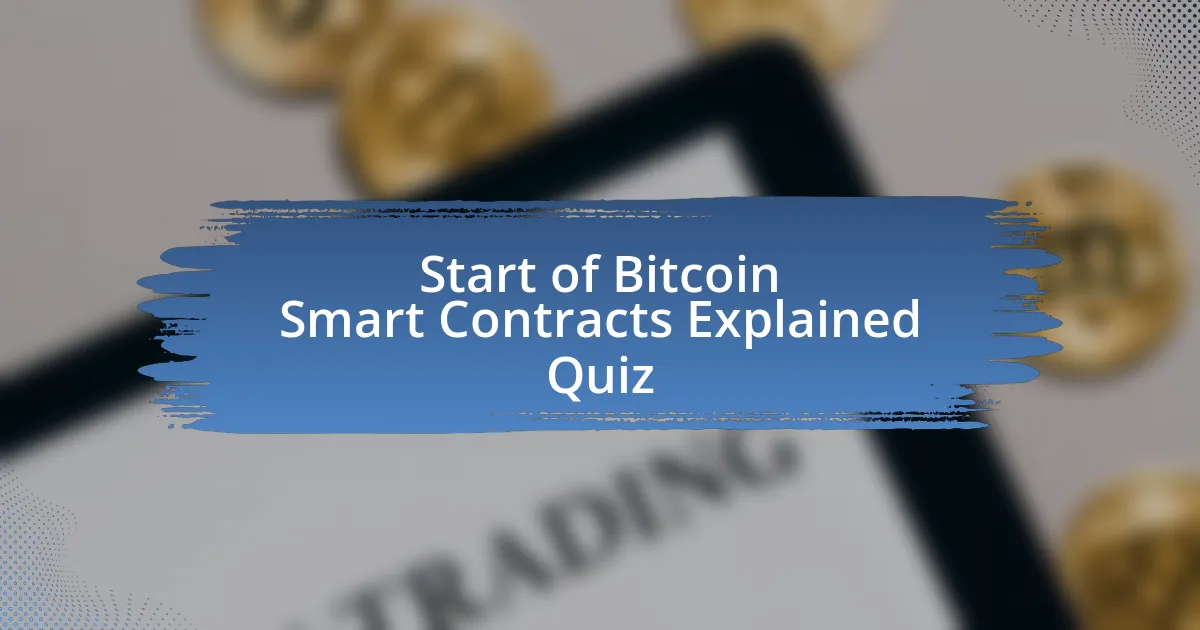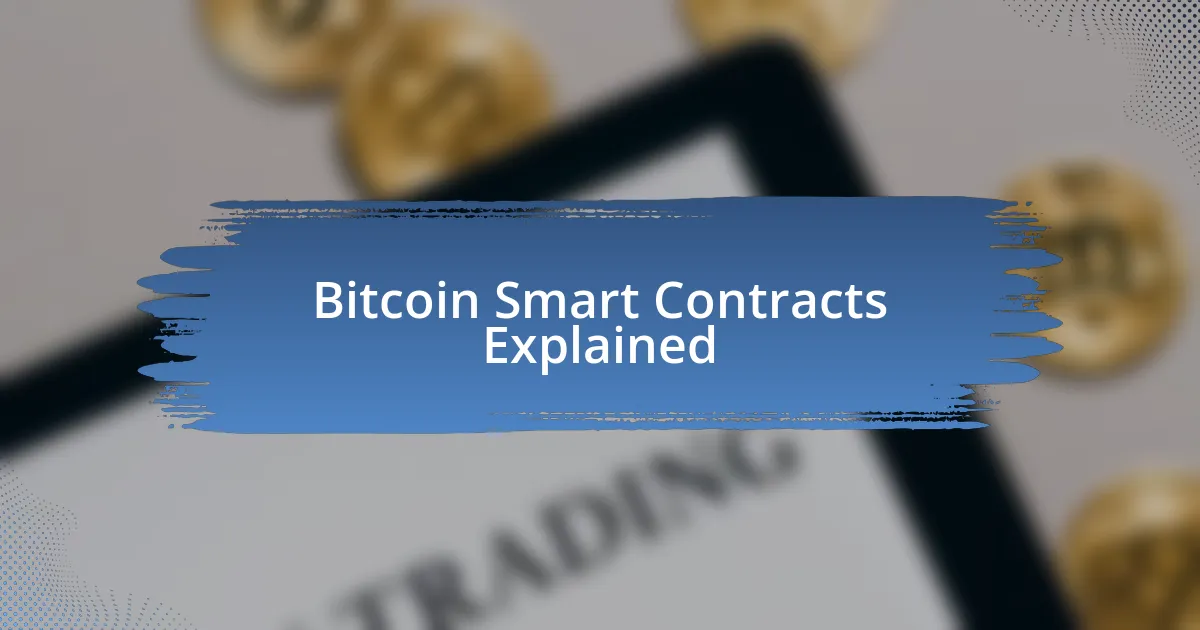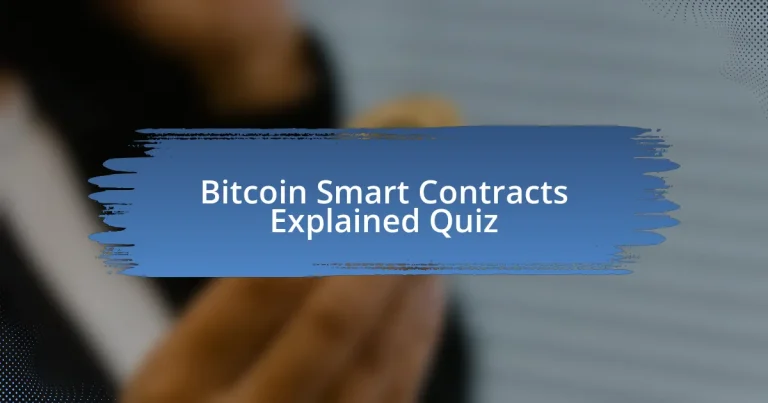
Start of Bitcoin Smart Contracts Explained Quiz
1. What is a Bitcoin smart contract?
- A type of Bitcoin wallet used for securing funds.
- A digital agreement stored and executed across all nodes in the Bitcoin (BSV) Blockchain network.
- A physical contract that must be signed and notarized.
- A document that requires a third party to validate its contents.
2. Who coined the term `Smart Contracts`?
- Vitalik Buterin
- Satoshi Nakamoto
- Nick Szabo
- Hal Finney
3. What is the primary purpose of a Bitcoin smart contract?
- To analyze market trends and provide investment advice.
- To create and maintain a cryptocurrency wallet.
- To store and manage digital currencies securely.
- To facilitate, verify, or enforce the terms of an agreement without the need for a third party.
4. How are Bitcoin smart contracts stored and replicated?
- The Bitcoin (BSV) transactions are stored only on the user`s local device for privacy.
- Smart contracts in Bitcoin are replicated through email communication between users.
- Bitcoin smart contracts are stored solely in private databases controlled by developers.
- The Bitcoin (BSV) ledger stores and replicates the agreement, giving it security and immutability.
5. What is the scripting language used for creating Bitcoin smart contracts?
- Python
- Ruby
- Script
- JavaScript
6. What does Bitcoin`s Script lack compared to other blockchains?
- The function to create smart contracts with user interfaces
- The opcodes that can read and write the current `state` of the blockchain
- The ability to execute complex algorithms efficiently
- Support for multiple programming languages besides Script
7. How do Bitcoin smart contracts function?
- They function through manual processing and human intervention to complete agreements.
- They require physical signatures on paper to validate the contract between parties.
- They use a `lock and key` system where the sender establishes a condition and the recipient provides a corresponding key in the form of code in Script.
- They are executed by a centralized authority that governs the Bitcoin network.
8. What is P2SH (Pay-to-Script-Hash)?
- A basic transaction type allowing only simple payments without conditions.
- A protocol for issuing new cryptocurrencies from the Bitcoin network.
- A method that allows complex scripts, such as multi-signature and smart contracts, without revealing the script details in the transaction.
- A method for converting Bitcoin into cash through ATMs.
9. How does P2SH work?
- A user creates a public key and sends bitcoins without the need for a script hash.
- A user must always expose the full script details before sending bitcoins to a P2SH address.
- A user sends bitcoins directly to another user`s wallet address without any scripts.
- A user creates a script, hashes it, and sends bitcoins to the hash of the Script (P2SH address). To spend the bitcoins, the user reveals the original Script and satisfies its conditions.
10. What is the primary benefit of using P2SH?
- It reduces transaction fees significantly for all users[3].
- It allows for unlimited storage of transaction data on the blockchain[3].
- It enhances user privacy by keeping the Script private until the transaction is spent[3].
- It guarantees all transactions are immediately reversible regardless of conditions[3].
11. What is the difference between traditional and smart contracts?
- Smart contracts auto-execute once conditions are met, and no middlemen are required.
- Smart contracts require a mediator to enforce the terms of the agreement.
- Traditional contracts require verbal consent and no written agreement is necessary.
- Traditional contracts are solely enforced by government regulations.
12. How do Bitcoin smart contracts enforce agreements?
- They only serve as a digital record without any enforcement capabilities.
- They depend on third parties to validate contract fulfillment during execution.
- They require manual intervention to finalize agreements after execution.
- They automatically enforce and execute the terms of a contract based on predefined rules.
13. What is an example of a simple smart contract?
- A digital market for trading stocks and bonds.
- An `if/then` agreement written in computer code.
- A complex algorithm for financial forecasting.
- A method for sending encrypted messages.
14. What is the vending machine analogy for understanding smart contracts?
- A vending machine only accepts quarters and gives out change instead of items.
- A vending machine takes your cash, connects it to a desired snack choice, and dispenses it once you select an item.
- A vending machine waits for a server to dispense an item after a payment is made.
- A vending machine stores your snacks and requires you to enter a code to get them.
15. What are the core benefits of smart contracts?
- Limited access to contracts for only a few parties involved
- Dependence on traditional legal systems for enforcement
- Speed, efficiency, and transparency in agreements, eliminating the need for costly intermediaries
- Increased reliance on manual oversight for all transactions
16. What are some Bitcoin Improvement Proposals (BIPs) that brought smart contract capability to the protocol?
- OP_ADD, OP_MULTIPLY, OP_SUBTRACT
- OP_SWAP, OP_ROTATE, OP_DUP
- OP_RETURN, OP_CHECKLOCKTIMEVERIFY, OP_CHECKSEQUENCEVERIFY
- OP_IF, OP_ELSE, OP_ENDIF
17. What are some basic smart contract functions in Bitcoin?
- Currency issuance, overflow protection, peer-to-peer lending
- Centralized authority, user data tracking, transaction fees
- Escrows, time-bound payments, multi-party agreements, and more
- Identity verification, account recovery, fraud detection
18. How does Bitcoin’s scripting language intentionally limit complexity?
- By supporting advanced programming constructs such as loops and variables.
- By allowing unlimited opcodes for complex contract executions.
- By not including opcodes that can read and write the current `state` of the blockchain.
- By enabling dynamic interactions with external databases directly.
19. What is the role of Script in enhancing security and predictability?
- Script serves as the primary interface for user interactions with the network.
- Script helps organize transaction data and balances for easy access.
- Script simplifies accounting tasks by automating balance calculations.
- Script enhances security and predictability by focusing on recording ownership and enabling the transfer of coins via UTXOs.
20. What is the difference between Bitcoin and Ethereum in terms of smart contract capabilities?
- Bitcoin`s Script is less versatile than Ethereum`s Solidity, lacking opcodes for complex automated tasks.
- Ethereum smart contracts are executed on a centralized server, unlike Bitcoin.
- Bitcoin supports more programming languages for smart contracts than Ethereum.
- Ethereum uses a simpler scripting language than Bitcoin for contracts.
21. How do Bitcoin smart contracts handle multi-signature requirements?
- They use complex scripts that require multiple signatures to authorize transactions.
- They only use one signature regardless of the parties involved.
- They automatically execute without any signature requirements at all.
- They rely on traditional banking verification for transaction approval.
22. What is the purpose of using multi-signature accounts in Bitcoin smart contracts?
- To make all Bitcoin transactions anonymous and untraceable.
- To allow anyone to spend funds at any time without restrictions.
- To ensure that spending funds only occurs when a required percentage of people agree.
- To eliminate the need for any form of agreement between parties.
23. Can Bitcoin smart contracts communicate with each other?
- Yes, but only if they are written in the same programming language.
- No, they operate completely independently without interaction.
- Yes, they can communicate with each other and influence the execution of one another.
- No, their communication is strictly forbidden by the protocol.
24. What are some key attributes of Bitcoin smart contracts?
- They operate solely within isolated environments and cannot interact with other smart contracts.
- They rely on external audits to validate terms and enforce agreements within the network.
- They are self-verifiable, self-executable, and tamper-proof, with built-in enforcement features like freezing, thawing, and confiscating tokens.
- They require physical signatures to be considered valid and enforceable.
25. How do Bitcoin smart contracts handle structured data from outside their environment?
- They can process structured data through privileged actors or Oracles.
- They ignore all structured data from outside their environment.
- They cannot interact with any external applications or services.
- They rely on human intervention to interpret external data sources.
26. What is the significance of the `lock and key` system in Bitcoin smart contracts?
- The sender establishes a condition (lock) and the recipient provides a corresponding key in the form of code in Script.
- The sender locks the funds in a vault until the recipient pays a fee.
- The sender encrypts the contract in a private message to the recipient.
- The sender creates a unique password that allows anyone to access the funds.
27. What is the benefit of using P2SH addresses?
- It makes transactions faster by reducing block size.
- It allows for unlimited script complexity in transactions.
- It enhances user privacy by keeping the Script private until the transaction is spent[3].
- It adds more fees for each transaction made.
28. How do Bitcoin smart contracts handle token management?
- They have built-in features to freeze, thaw, and confiscate tokens, enabling parties to manage their tokens effectively and comply with laws and regulations.
- They exclusively allow tokens to be transferred without any restrictions.
- They depend entirely on external systems for all token management activities.
- They permit only the sender to manage the tokens without input from the recipient.
29. What is the role of Oracles in Bitcoin smart contracts?
- Oracles help process structured data from outside the environment of the smart contract.
- Oracles validate transactions within the Bitcoin blockchain.
- Oracles create the terms of Bitcoin smart contracts autonomously.
- Oracles are used to mine new Bitcoin blocks more efficiently.
30. What is the primary characteristic of Bitcoin smart contracts?
- They require a trusted intermediary to validate agreements.
- They are self-executing contracts where the terms of the agreement are directly written into lines of code.
- They cannot operate without human oversight at all times.
- They are manually executed by participants involved in the agreement.

Quiz Completion: Congratulations!
You’ve successfully completed the quiz on ‘Bitcoin Smart Contracts Explained.’ We hope you found the process both enjoyable and enlightening. Understanding the foundations of smart contracts within the Bitcoin ecosystem is crucial for grasping how blockchain technology transforms various industries.
Throughout this quiz, you likely learned about the unique aspects of Bitcoin smart contracts, including their functionality and practical applications. You gained insights into how they differ from traditional contracts and the benefits they bring, such as enhanced security and automation. Each question reinforced your knowledge and highlighted the importance of this evolving technology.
Now that you’ve tested your understanding, we invite you to delve deeper. Explore the next section on this page dedicated to ‘Bitcoin Smart Contracts Explained.’ This resource will expand your knowledge and provide further context. Equip yourself with a more comprehensive understanding that can enhance your grasp of digital innovation. Happy learning!

Bitcoin Smart Contracts Explained
Understanding Bitcoin and its Limitations
Bitcoin is a decentralized digital currency that enables peer-to-peer transactions. It operates on a blockchain, which is a public ledger of all transactions. However, Bitcoin has limitations, particularly in terms of programming complex logic. It primarily supports straightforward transactions, and this lack of flexibility restricts the creation of intricate applications, such as smart contracts readily available on other platforms like Ethereum.
What are Smart Contracts?
Smart contracts are self-executing contracts with the terms of the agreement directly written into code. They run on blockchain technology, automating execution when predefined conditions are met. Smart contracts enhance transparency and reduce the need for intermediaries, which can lower costs and increase efficiency. This functionality is typically associated with platforms designed for complex scripting.
Bitcoin’s Approach to Smart Contracts
Bitcoin employs a simpler approach to smart contracts compared to other blockchains. The Bitcoin script language enables basic conditional transactions but lacks advanced features like loops or complex data structures. This makes Bitcoin capable of certain smart contract functionalities, but within a narrow scope. Typical applications include multi-signature wallets and certain payment conditions.
Types of Smart Contracts on Bitcoin
In Bitcoin, smart contracts often manifest as escrow services, payment channels, and multi-signature wallets. Escrow services allow funds to be held until certain conditions are met, while payment channels help facilitate quicker transactions without congesting the main blockchain. Multi-signature wallets enhance security by requiring multiple keys for transaction approval, embodying the essence of a smart contract.
The Future of Smart Contracts on Bitcoin
The future of smart contracts on Bitcoin may include advancements with the integration of sidechains or layer-2 solutions like the Lightning Network. These technologies aim to enhance functionality and scalability. Ongoing development in Bitcoin Improvement Proposals (BIPs) could introduce more sophisticated scripting capabilities, allowing for richer smart contract possibilities without compromising Bitcoin’s foundational principles.
What are Bitcoin Smart Contracts?
Bitcoin Smart Contracts are self-executing contracts with the terms directly written into code. They operate on the Bitcoin blockchain, using its scripting language. This allows for automated transactions once predetermined conditions are met, ensuring trust and reducing intermediaries. Smart contracts on Bitcoin are more limited than those on platforms like Ethereum, primarily due to Bitcoin’s simpler scripting capabilities.
How do Bitcoin Smart Contracts work?
Bitcoin Smart Contracts work by using conditional logic coded into transactions. When specific conditions are triggered, the contract’s execution occurs automatically. This is achieved through Bitcoin’s scripting language, which is a stack-based language allowing instructions to be processed during the validation of a transaction. Each condition that must be met is clearly defined in the code, simplifying the transaction process.
Where can Bitcoin Smart Contracts be implemented?
Bitcoin Smart Contracts can be implemented in various scenarios, including decentralized finance (DeFi), supply chain management, and property transfers. These applications utilize the contract’s ability to ensure that obligations are met before any transfers occur. For example, they can automate the release of funds upon the verification of goods delivered, minimizing the need for trust in intermediaries.
When were Bitcoin Smart Contracts introduced?
Bitcoin Smart Contracts were introduced with the release of Bitcoin itself in 2009. The concept of programmability within Bitcoin’s blockchain became more prominent over the years as developers began exploring its scripting capabilities. Although they have existed since Bitcoin’s inception, their potential has gained attention as decentralized applications evolved across the blockchain ecosystem.
Who developed Bitcoin Smart Contracts?
Bitcoin Smart Contracts were not developed by a single individual but emerged from the collective work of the Bitcoin development community. Satoshi Nakamoto, the pseudonymous creator of Bitcoin, laid the foundation through the introduction of the Bitcoin protocol, which included a basic scripting language. Since then, various developers have expanded on these concepts and capabilities within the community.


